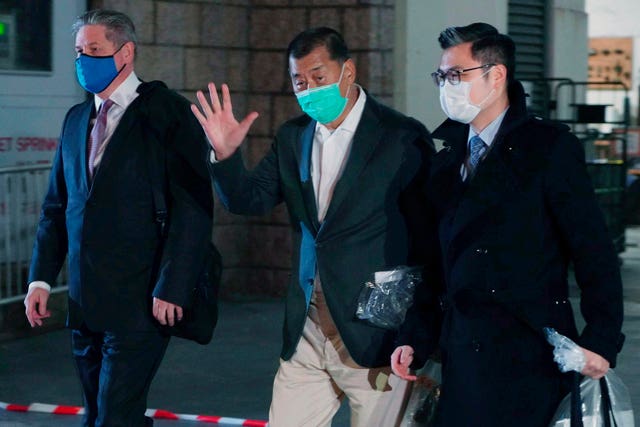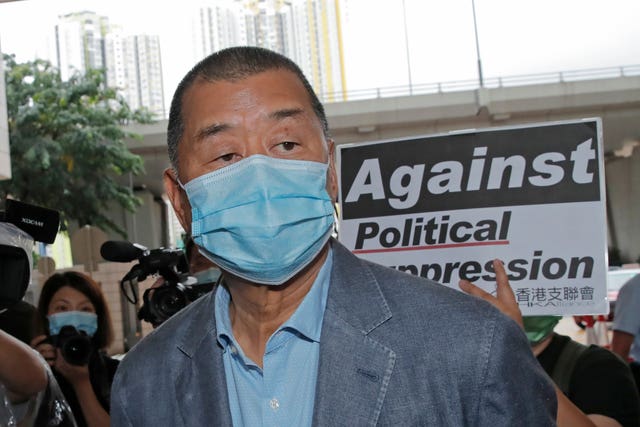
Henry Riley 7pm - 10pm
19 May 2023, 09:54

Jimmy Lai, the founder of the now-defunct newspaper Apple Daily, is facing national security charges.
A Hong Kong court has rejected an activist publisher’s latest effort to use a British lawyer to defend him against national security charges as Beijing tries to crush a pro-democracy movement.
Jimmy Lai, the 75-year-old founder of the now-defunct newspaper Apple Daily, faces up to life in prison if convicted.
In November, the city’s top court approved Lai hiring veteran lawyer Timothy Owen for the case, but the city’s national security authorities blocked the move.
Lai and most of Hong Kong’s leading pro-democracy activists were arrested after Beijing imposed a national security law on the former British colony following massive anti-government protests in 2019.
The political saga over Lai’s choice of lawyer is widely seen as part of the city’s crackdown on dissidents after the protests.
🚨 #HongKong : Jimmy Lai has fought for press freedom his whole life – and now it's our turn to fight for him.RSF's @rebecca_vincent explains why we've brought together 116 media leaders from around the world, united in a single call on Hong Kong: #FreeJimmyLai ! pic.twitter.com/kknI5aahz5
— RSF (@RSF_inter) May 16, 2023
On Friday, Judge Jeremy Poon rejected Lai’s request to overturn the committee for safeguarding national security’s decision. Judge Poon ruled courts have no jurisdiction over the committee under the security law.
The political row over Lai’s lawyer began in November when the government voiced objection to it and asked Beijing to step in soon after the top court gave its approval.
China’s top legislative body did not directly rule whether foreign lawyers who do not normally practice in the city could handle national security cases. But it said the power to decide belongs to the city’s leader and the committee.
Critics said Beijing’s intervention damaged the city’s judicial independence, which was promised to the city when it returned to Chinese rule in 1997.
The committee concluded that allowing Mr Owen to represent Lai would likely pose national security risks and advised the director of immigration to refuse any new work visa applications by Owen that involve representing the media tycoon in the case.
The director of immigration said his department would act in accordance with that advice.
Lai’s lawyers filed an application in April for judicial review, asking the court to quash the committee and director’s decisions. They argued that the committee’s duties relate to matters of general policy and coordinating “major works and significant operations”.
“There is no power or jurisdiction to determine specific questions arising from cases, let alone overturn judicial decisions,” they wrote in the application.

Robert Pang, one of Lai’s lawyers, insisted in an earlier hearing that the committee had overstepped its powers, saying the court had the power and the duty to ensure that the law was properly applied.
But Judge Poon ruled on Friday that the decision is fully within the committee’s power under the security law, as “interpreted by the interpretation”, and the supervisory power over the committee is reserved to China’s central government exclusively.
The courts do not hold power over such matters “because they clearly fall outside the courts’ constitutional competence assigned to them”, he wrote.
Lai’s trial, originally scheduled to begin on December 1 last year, was postponed until September as the city awaited Beijing’s decision.
He is accused of conspiring with others to call for sanctions or blockades, or engage in hostile activities against Hong Kong or China.

The 75-year-old also faces a charge of collusion with foreign forces to endanger national security, and a separate sedition charge under a colonial-era law that is increasingly used to crush dissent.
Lai was sentenced to five years and nine months for a separate fraud case in December.
As of Tuesday, more than 100 publishers and editors around the world – including 2021 Nobel Peace Prize laureates Dmitry Muratov and Maria Ressa – have signed a joint statement calling for his immediate release, according to the Reporters Without Borders, which coordinated the move.
But the government, without naming any groups, condemned what it called wrongful attempt to interfere with the city’s judicial proceedings under the pretext of press freedom.
It insisted the prosecution of Lai was completely unrelated to the issue of press freedom.
Last week, Hong Kong lawmakers also passed an amendment to a law granting the city’s leader the power to bar overseas lawyers from handling national security cases.
Critics said the changes will leave defendants with even fewer choices when they look for legal representation in some of the city’s most controversial cases.
The National Security Law criminalises acts of subversion, terrorism, and collusion with foreign forces.
It has led to the arrests of many prominent democracy activists and damaged faith in the future of the international financial hub.